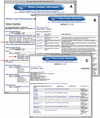MGD: the Mouse Genome Database
- PMID: 12519980
- PMCID: PMC165494
- DOI: 10.1093/nar/gkg047
MGD: the Mouse Genome Database
Abstract
The Mouse Genome Database (MGD) (http://www.informatics.jax.org) one component of a community database resource for the laboratory mouse, a key model organism for interpreting the human genome and for understanding human biology. MGD strives to provide an extensively integrated information resource with experimental details annotated from both literature and on-line genomic data sources. MGD curates and presents the consensus representation of genotype (sequence) to phenotype information including highly detailed information about genes and gene products. Primary foci of integration are through representations of relationships between genes, sequences and phenotypes. MGD collaborates with other bioinformatics groups to curate a definitive set of information about the laboratory mouse. Recent developments include a general implementation of database structures for controlled vocabularies and the integration of a phenotype classification system.
Figures

Similar articles
-
The Mouse Genome Database (MGD): integrating biology with the genome.Nucleic Acids Res. 2004 Jan 1;32(Database issue):D476-81. doi: 10.1093/nar/gkh125. Nucleic Acids Res. 2004. PMID: 14681461 Free PMC article.
-
The Mouse Genome Database (MGD): from genes to mice--a community resource for mouse biology.Nucleic Acids Res. 2005 Jan 1;33(Database issue):D471-5. doi: 10.1093/nar/gki113. Nucleic Acids Res. 2005. PMID: 15608240 Free PMC article.
-
The Mouse Genome Database (MGD): the model organism database for the laboratory mouse.Nucleic Acids Res. 2002 Jan 1;30(1):113-5. doi: 10.1093/nar/30.1.113. Nucleic Acids Res. 2002. PMID: 11752269 Free PMC article.
-
Mouse Genome Database: From sequence to phenotypes and disease models.Genesis. 2015 Aug;53(8):458-73. doi: 10.1002/dvg.22874. Epub 2015 Jul 27. Genesis. 2015. PMID: 26150326 Free PMC article. Review.
-
Mouse Genome Informatics (MGI) Is the International Resource for Information on the Laboratory Mouse.Methods Mol Biol. 2018;1757:141-161. doi: 10.1007/978-1-4939-7737-6_7. Methods Mol Biol. 2018. PMID: 29761459 Review.
Cited by
-
The harmonizome: a collection of processed datasets gathered to serve and mine knowledge about genes and proteins.Database (Oxford). 2016 Jul 3;2016:baw100. doi: 10.1093/database/baw100. Print 2016. Database (Oxford). 2016. PMID: 27374120 Free PMC article.
-
Molecular processes during fat cell development revealed by gene expression profiling and functional annotation.Genome Biol. 2005;6(13):R108. doi: 10.1186/gb-2005-6-13-r108. Epub 2005 Dec 19. Genome Biol. 2005. PMID: 16420668 Free PMC article.
-
Expansion of adult beta-cell mass in response to increased metabolic demand is dependent on HNF-4alpha.Genes Dev. 2007 Apr 1;21(7):756-69. doi: 10.1101/gad.1535507. Genes Dev. 2007. PMID: 17403778 Free PMC article.
-
Genew: the Human Gene Nomenclature Database, 2004 updates.Nucleic Acids Res. 2004 Jan 1;32(Database issue):D255-7. doi: 10.1093/nar/gkh072. Nucleic Acids Res. 2004. PMID: 14681406 Free PMC article.
-
A comparative study of endoderm differentiation in humans and chimpanzees.Genome Biol. 2018 Oct 15;19(1):162. doi: 10.1186/s13059-018-1490-5. Genome Biol. 2018. PMID: 30322406 Free PMC article.
References
-
- Denny P. and Justice,M.J. (2000) Mouse as the measure of man? Trends Genet., 16, 283–287. - PubMed
-
- Naf D., Krupke,D.M., Sundberg,J.P., Eppig,J.T. and Bult,C.J. (2002) The Mouse Tumor Biology Database: a public resource for cancer genetics and pathology of the mouse. Cancer Res., 62, 1235–1240. - PubMed

